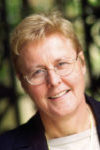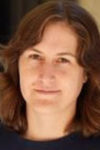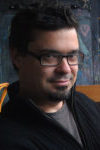Exoplanets and Life in Space

Panel Discussion
 Chair: Professor Rachel Webster
Chair: Professor Rachel Webster
Panellists: Dr Katie Mack, Associate Professor Alan Duffy, Dr Upulie Divisekera, Dr Morgan Saletta
What’s out there? How do we get there?
We live in exciting times, with a truly stunning rate of discovery unfolding before our very eyes from the various deep-space scanning initiatives reporting an array of ‘exoplanets,’ planets orbiting nearby, neighbouring stars. Enticing as this is: with our current capacities for travel through space, even this relatively small leap across interstellar space makes a nonsense of human timescales. Our current methods of space travel and propulsion would take an interstellar craft tens of thousands of years to reach neighbouring systems, presuming there was a way for its inhabitants to survive such a journey.
Can science take us to space, and to the stars? What forms might life take in other environments, with other branches of evolution to unfold? If life is found elsewhere, is sentient life a part of the picture, and what might that mean for a space-faring human species? Join us to explore the near universe and discuss the possibilities!
 Ms Upulie Divisekera
Ms Upulie Divisekera
Coordinator of @realscientists
Molecular Biologist, Faculty of Engineering, Monash University
Are we alone in the universe? Is there other life out there? Can we travel to other planets in our Solar Systems, and cross the galaxy? For the first time in history, we can detect, even photograph other planets. We can interpret their composition, size, orbits. We’ve discovered moons in our own Solar System with conditions capable of hosting life as we know it. But finding life in the universe may not be as straightforward as we think, and we might have to reconfigure our definition of life. Travelling into space to find life and to explore the galaxy might also require more imaginative and long term thinking. Either way, humans will be able to innovate new ways to see life and to travel in space.
Dr Upulie Divisekera is a molecular biologist, science communicator and writer based in Melbourne. Over her research career, Upulie has worked in cancer research, developmental biology and is currently involved with nanotechnology research. She co-founded the highly successful science outreach program, Real Scientists, and communicates science through writing, performance and radio. Upulie is interested in the intersection of science and culture and works with the Wheeler Centre to bring novel science programming to Melbourne.
 Dr Katie Mack
Dr Katie Mack
Theoretical Astrophysicist, DECRA Fellow
School of Physics, The University of Melbourne
Rather than being a purely philosophical question, “Are we alone in the Universe?” is a matter of active, rigorous, scientific research. With new technologies and observational clues, we’re closer than ever before to being able to find and characterise extraterrestrial life. Where might it be, and how are we looking for it? What are the chances that aliens really are out there? We’ll discuss these questions and the status of our search for life both within our Solar System and throughout the Galaxy.
Dr Katherine (Katie) Mack is a theoretical astrophysicist. Her work focuses on finding new ways to learn about the early universe and fundamental physics using astronomical observations, probing the building blocks of nature by examining the cosmos on the largest scales. Throughout her career as a researcher at Caltech, Princeton, Cambridge, and now Melbourne University, she has studied dark matter, black holes, cosmic strings, and the formation of the first galaxies in the Universe. Katie is also an active online science communicator and is passionate about science outreach. As a science writer, she has been published by Slate, Sky & Telescope, Time.com, the Economist tech blog “Babbage”, and other popular publications.
 Associate Professor Alan Duffy
Associate Professor Alan Duffy
Science Communicator & Astrophysicist
Centre for Astrophysics & Supercomputing, Swinburne University
Our exploration of the Solar System is pushing the limits of communication, involving giant radio dishes across the world as part of NASA’s Deep Space Network just to discern the whisper of radio signal against the background of space and our own noisy planet. Yet fundamental limits to transmitting signal no faster than the speed of light force us to do evermore of the decision making on board our craft rather than wait for ‘mission control’ on Earth. The near future of space exploration will see a revolution in smart probes, intelligently guiding themselves in their mission. The far future may yet see us explore even further, to the stars themselves.
Let’s explore the challenges and opportunities awaiting us in space and why Hal from 2001: A Space Odyssey may in fact be your crew mate when we do leave Earth for the inner Solar System!
Swinburne astronomer Associate Professor Alan Duffy works on dark matter, dark energy, galaxy formation and cosmology as well as explaining science nationally on TV. He is an experienced public speaker, science communicator and science expert in Melbourne.
 Dr Morgan Saletta
Dr Morgan Saletta
Anthropologist of Science & Technology
School of Historical & Philosophical Studies, The University of Melbourne
Surrounding Earth is a cold, dark and deadly sea- vast beyond imagination. But you wouldn’t know it from the local weather report- sunny with a chance of rain. Thanks to Earth’s magnetic field and atmosphere, we carry on our daily lives without much thought to the fragile life support system of our Spaceship Earth.
If we’re going to live out there, in near Earth orbit, on the moon, Mars, the asteroid belt, or anywhere else in the vast expanse of the solar system – we’re going to need to take our life support system and radiation shields with us. We’ll need food, shelter, clothing, tools and fuel for transport. What we can’t take with us, we’re going to have to find, extract, process, build and grow. Let’s explore some of the emerging technologies, from inflatable habitats and 3D printing to biophilic design, that we’ll use to colonize the final frontier.
Dr Morgan Saletta‘s areas of expertise include science and technology policy, complex systems, business history and strategy, innovation and entrepreneurship. Current research interests include the commercialisation of space, new business models, energy, the circular and sharing economies and public, private and hybrid strategies for a sustainable, resilient future in the Anthropocene. He completed his PhD in Science and Technology Studies and the History and Philosophy of Science at the University of Melbourne.






